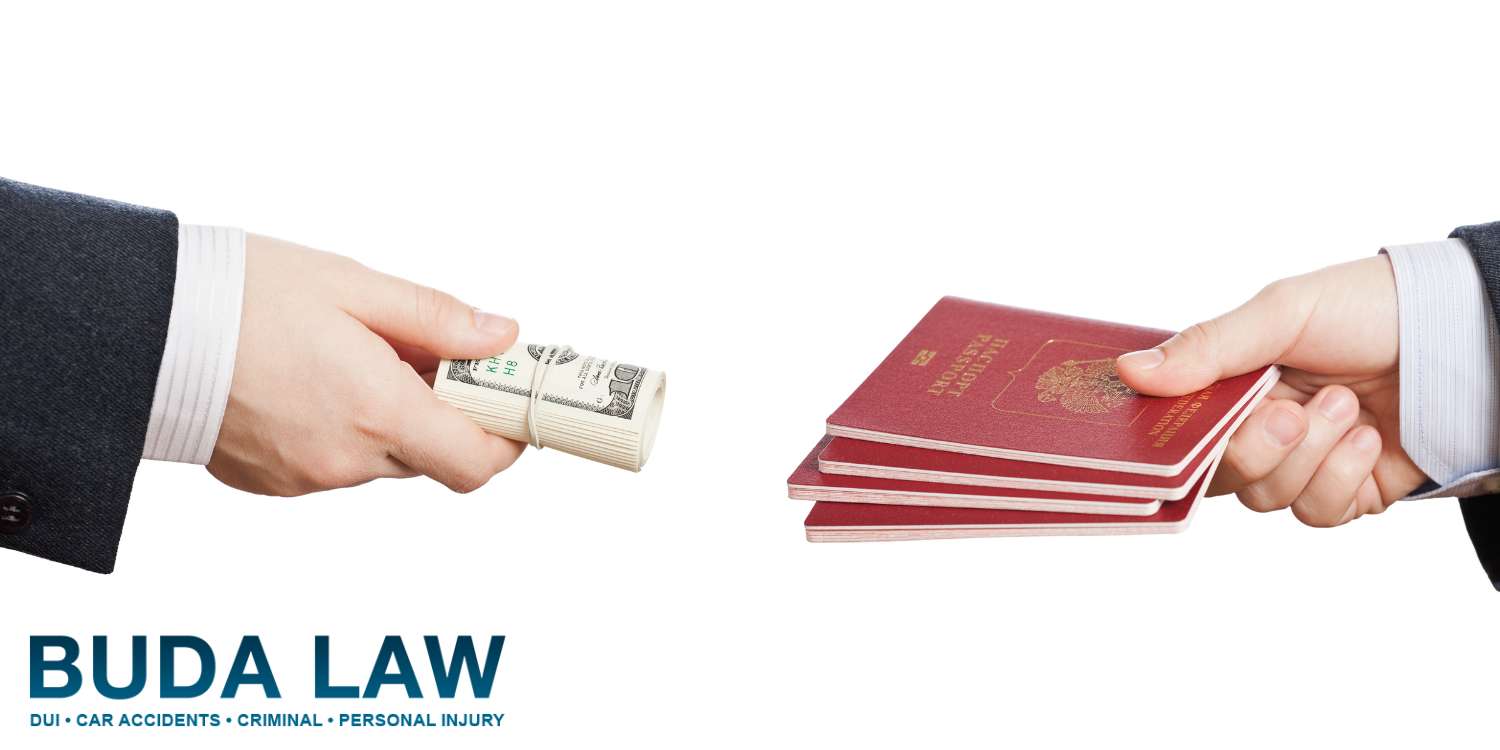Aggressively Fighting for the Best Possible Outcome
TAMPA FORGERY LAWYER
Experienced Criminal Defense Attorney for Forgery Charges Throughout Hillsborough County
When facing criminal charges in Hillsborough County for forgery, look to the experienced criminal defense lawyers at Buda Law. Led by seasoned criminal defense attorney and former prosecutor Andrew Buda, our Tampa criminal defense attorneys understand the serious implications of forgery charges in Tampa and the surrounding areas, ranging from hefty fines to significant prison time.
Whether you’re dealing with criminal charges related to counterfeit documents, falsified records, or any other offenses considered forgery, our law office is equipped to offer the aggressive defense you deserve.

Call Buda Law at (813) 322-2832 or reach out online to schedule a free consultation with experienced criminal defense attorney Andrew Buda today.
What is a Forgery Charge?
A forgery charge is a legal accusation that occurs when an individual is alleged to have intentionally modified, created, or used a document to deceive or commit fraud. This is considered a white-collar crime and can involve a wide array of documents, including but not limited to checks, contracts, identification cards, and legal certificates.
The essence of a forgery charge hinges on the act of falsification, whether by fabricating a document from scratch, altering an existing one to convey false information, or presenting a counterfeit item as genuine, with the clear intent to defraud.
It’s important to take these accusations seriously as penalties for a forgery conviction can result in fines, imprisonment, and the requirement to make restitution to any victims. If you’ve been charged with forgery, contact the Tampa white-collar crime attorneys at our law firm today.

Is Forging a Signature Illegal?
Forging a signature is illegal and considered a form of forgery. This act involves the unauthorized signing of another person’s name on a document with the intent to deceive or commit fraud.
Signature forgery can occur in various contexts, ranging from financial transactions and legal documents to personal checks and contracts.
The legality hinges not just on the act of forging the signature itself, but also on the intention behind it, which is to mislead or harm another party by creating or using a document under false pretenses.
What is the Difference Between Forgery and Uttering?
Forgery and uttering, while closely related, are distinct offenses in criminal law. Forgery refers to the act of creating, altering, or imitating a document, signature, banknote, or any other object of value with the intent to deceive. In short, it is the process of making a fake or fraudulent document.
Uttering, on the other hand, involves the act of passing or using the forged document with the knowledge of its falseness and with the intent to defraud.
While forgery is the creation of a fraudulent document or signature, uttering is the circulation or use of that fraudulent document as if it were genuine. Both acts are considered serious crimes because they undermine trust in financial and legal transactions, but it is the combination of both, creating a fraudulent document and then attempting to use it, that fully realizes the crime’s potential to cause harm.
Florida Statute 831.01
Florida Statute 831.01 addresses the crime of forgery, outlining the legal framework for what constitutes this criminal offense and the penalties involved. Under this statute, forgery is defined as the act of falsely making, altering, forging, or counterfeiting any public record, certificate, legal document, bill of exchange, promissory note, or any other instrument of writing with the intention to injure or defraud any person.
This general definition encompasses a wide range of documents, reflecting the statute’s comprehensive approach to fighting forgery. The act of forgery under this statute is considered a felony.
Conviction under Florida Statute 831.01 can lead to significant legal penalties, including imprisonment, fines, and a permanent criminal record.

Examples of Forgery
Forgery includes many activities where documents are fraudulently created or altered to deceive. Listed below are examples of a range of fraudulent acts that are considered to be acts of forgery:
- Financial Document Forgery: Creating or altering checks, bank statements, or other financial documents to steal money or obtain goods and services under false pretenses. This can range from forging a signature on a check to altering the amount payable.
- Identity Documents: Falsifying or counterfeiting government-issued IDs, such as driver’s licenses or passports, often to assume another person’s identity or create a fictitious one for illegal activities.
- Legal Document Forgery: Tampering with or fabricating legal documents, including wills, deeds, court orders, or contracts, to unlawfully benefit from the altered terms or to deprive another of their rights.
- Art and Historical Document Forgery: Creating or modifying art pieces, antiques, or historical documents to present them as original or more valuable than they actually are.
- Academic Forgery: Falsifying academic credentials, such as diplomas or transcripts, to gain employment, admission to educational programs, or other benefits.
- Medical Records Forgery: Altering or creating medical documents, such as prescriptions or patient records, can be used to obtain controlled substances or make fraudulent insurance claims.
- Certificates and Licenses: Falsifying professional certifications, licenses, or any other documents that prove qualifications or permissions, to practice a profession or conduct activities that require certification.
These examples highlight the diversity of forgery offenses affecting various sectors of society. However, each instance of forgery is aimed at deception for personal gain, fraud, or to cause harm to others, carrying significant legal consequences upon discovery and prosecution.
What is the Penalty for Forgery in Florida?
Forgery is typically classified as a third-degree felony under Florida law, particularly when it involves public records, legal documents, or financial instruments such as checks and contracts. Individuals convicted of forgery can face up to 5 years in prison, 5 years of probation, and fines up to $5,000. Under the Florida Criminal Punishment Code, forgery is ranked as a Level 1 felony crime.
The penalties can vary based on the nature of the forgery, the value of the fraud, and the defendant’s criminal history. Those found guilty may also be ordered to pay restitution to the victims to compensate for any financial losses incurred due to the forgery.
If you’re facing criminal charges for forgery in Florida, contact the Tampa felony defense attorneys at our law office to start building your defense today.

Forgery Charges in Federal Court
In severe cases, forgery charges can be tried in federal court for offenses involving the counterfeiting or falsifying government-issued documents, such as currency, postage stamps, military discharge certificates, and immigration documents, among others.
Federal authorities take these charges extremely seriously and often impose strict penalties, including substantial fines and lengthy prison sentences exceeding those at the state level. It’s important to note that when forgery is tried in the federal court, it does not prevent the state court from filing its own charges.
How To Get Out of Forgery Charges
Getting out of forgery charges involves a combination of legal defenses and strategic legal representation. Skilled criminal defense lawyers can evaluate the specifics of the criminal charges to identify viable defenses. They can also negotiate with the prosecution for reduced charges or alternative sentencing, especially in cases with first-time offenders or where the evidence of intent is weak.
Forgery Defenses
When strategizing legal defenses against forgery charges or any other white-collar crime, former prosecutors like Andrew Buda are especially adept at constructing the best defenses.
One common defense is challenging the prosecution’s assertion of intent to defraud, as intent is a crucial element that must be proven beyond a reasonable doubt for a conviction. Without clear evidence of intent, the foundation of the forgery charge may be significantly weakened.
Another defense involves disputing the accused’s knowledge of the forgery, arguing that the individual was unaware that the document or signature was falsified. Authorization plays a pivotal role in some cases, where the defense can demonstrate that the accused had legitimate authority to sign a document or act on behalf of another party.
Defenses can also focus on the document’s authenticity, questioning the prosecution’s claims about its falsification. Each of these defenses requires an understanding of the law and a strategic approach to highlighting weaknesses in the prosecution’s case.

Call Tampa, FL, Forgery Attorney Andrew Buda For a Free Consultation
Securing the right legal defense is crucial when facing forgery charges in Tampa. At Buda Law, criminal defense attorney Andrew Buda and his team of dedicated criminal defense attorneys will provide the resources and support you need as you face these serious allegations. Take the first step towards securing your defense by contacting Buda Law at (813) 322-2832 to schedule a free consultation with an experienced Tampa forgery attorney today.CASE RESULTS
Get the Toughness of a Trial Attorney
START BUILDING YOUR CASE
Schedule a Free Consultation
WHAT MAKES OUR DEFENSE SO EFFECTIVE?
- Former State Prosecutor
- Highly Responsive & Accessible
- Result-Oriented Advocacy
- We Prepare Every Case as if it's Going to Trial
- Personal Representation Centered Around You
- Exceptional Negotiator
